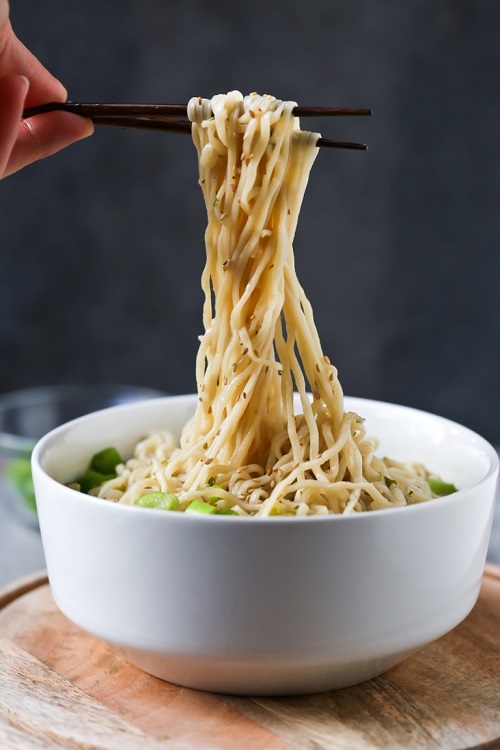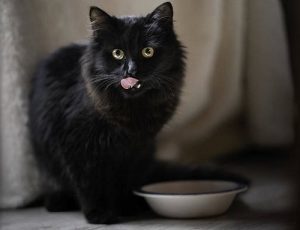Can Cats Eat Ramen? Read this article to find out the risks and benefits of sharing this popular dish with your pet.
Is there anything cuter than a cat crunching on a noodle? Perhaps not. But it brings up an interesting question: ‘Can Cats Eat Ramen?’ Whether you’re a cat owner or a ramen lover, or both, this article will answer that for you.
Can Cats Have Crab Rangoon? Find out here
What Is Ramen? 
Ramen is a popular Japanese dish that consists of wheat noodles served in a flavorful broth, typically made from a combination of meat or fish stock, soy sauce, miso, or salt. It’s garnished with various toppings such as sliced pork, seaweed, green onions, bamboo shoots, and soft-boiled eggs.
Ramen originated in China but has evolved into a unique and beloved part of Japanese cuisine. It gained popularity in Japan after World War II when many Chinese immigrants introduced their noodle dishes to the country. Over time, it has become a staple food in Japanese culture and has gained international recognition.
Types Of Ramen
There are several types of ramen, each with its own regional variations and distinct characteristics. Some popular styles include:
- Shoyu Ramen: This ramen features a soy sauce-based broth that is usually clear and brown in color. It is often topped with sliced pork, bamboo shoots, green onions, and nori (seaweed).
- Miso Ramen: Miso is a fermented soybean paste, and this ramen incorporates it into the broth, giving it a rich and savory flavor. It is often served with corn, bean sprouts, cabbage, and ground pork.
- Tonkotsu Ramen: This style originates from Kyushu, Japan, and features a creamy, pork bone-based broth. The broth is typically simmered for hours to extract the rich flavors and collagen from the bones. Tonkotsu ramen is often topped with sliced pork, black garlic oil, wood ear mushrooms, and pickled ginger.
- Shio Ramen: Shio means “salt” in Japanese, and this ramen style uses a clear, salty broth as its base. The broth is usually light and delicate, allowing the flavors of the other ingredients to shine. Common toppings include seafood, chicken, vegetables, and greens.
These are just a few examples, and there are many other regional and specialty variations of ramen available.
Can Cats Eat Ramen?
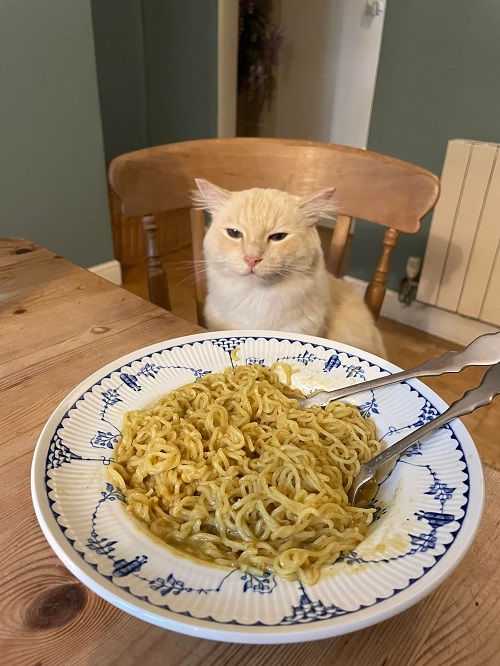
If ramen is your favorite dish, think twice before sharing it with your pet. It’s not recommended to feed ramen to cats because of its ingredients. Ramen is high in sodium, seasonings, and artificial ingredients, which are not safe for kitties.
As obligate carnivores, cats have specific dietary requirements, and their nutritional needs are best met through a balanced and appropriate cat food diet. It’s essential to talk to a veterinarian to determine the best diet for your pet.
Is Ramen Toxic To Cats?
Ramen is not directly toxic to cats, but certain components of it are harmful to their health. The main concerns are the high sodium content, seasonings, and additives commonly found in ramen noodles and broth. Additionally, they contain ingredients like onions, garlic, and spices, which are toxic to kitties.
Does Ramen Contain Any Nutritional Value For Cats?
Ramen, as human food, does not provide significant nutritional value to cats. While it does contain carbohydrates from the noodles and some protein from the broth, it lacks essential nutrients that felines need for optimal health.
Risks of Feeding Ramen To Cats
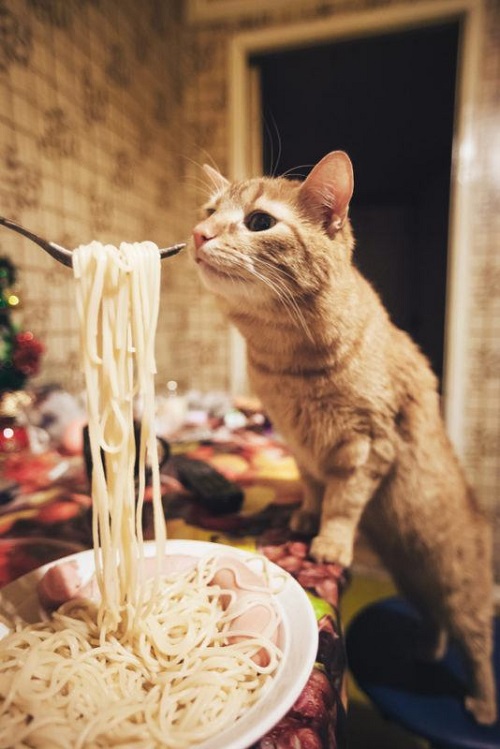
Feeding ramen to cats can pose several risks to their health and well-being due to the following reasons:
- High Sodium Content: Ramen noodles and broth are often high in sodium. Cats have a low tolerance for sodium, and excessive consumption can lead to dehydration and increased thirst.
- Seasonings and Additives: Many ramen dishes contain seasonings like onion, garlic, and spices, which are toxic to cats. These ingredients can cause anemia if ingested in significant amounts.
- Artificial Ingredients: Ramen often contains artificial ingredients, such as flavor enhancers, preservatives, and food colorings. These additives can be hard for cats to digest and lead to gastrointestinal upset or allergic reactions.
- Wheat Noodles: Most ramen noodles are made from wheat, which is not a natural part of a cat’s diet. The digestive systems of felines are optimized for meat consumption. Feeding them foods high in carbohydrates, like wheat noodles, can cause different health issues.
- Nutritional Imbalance: Ramen lacks the essential nutrients and balance necessary for a cat’s overall health. Feeding ramen to your feline can lead to nutritional deficiencies over time.
- Digestive Issues: Felines have sensitive digestive systems, and introducing unfamiliar or inappropriate foods like ramen can lead to stomach discomfort.
- Long-term Health Risks: Regularly feeding cats ramen or other unsuitable human foods can contribute to long-term health issues, like obesity. These conditions can significantly impact a cat’s quality of life.
My Cat Ate Ramen. What To Do?
- Assess the situation: Determine the number of ramen your cat has eaten and if it consumed any additional components like broth, seasonings, or toppings. This information will be helpful when discussing the situation with a vet.
- Watch for immediate signs of distress: Keep a close eye on your kitty for any signs of immediate distress or adverse reactions. These could include vomiting, excessive thirst, or lethargy.
- Provide fresh water: Offer your feline fresh water to drink, as ramen is high in sodium, which leads to increased thirst.
- Monitor your cat’s behavior and appetite: Keep an eye on your cat’s behavior, appetite, and litter box habits over the next few days. Look for any changes or abnormalities, such as decreased appetite, changes in water consumption, or unusual bathroom habits.
- Contact your veterinarian: Consult with a vet regarding the ramen your cat consumed. The vet will be able to provide professional guidance tailored to your cat’s specific situation.
Signs That Your Cat Ate Ramen
- Gastrointestinal upset: Look for signs of vomiting or diarrhea. Eating ramen, especially with seasonings or broth, can irritate your cat’s digestive system and lead to stomach upset.
- Increased thirst: Ramen is high in sodium, which makes your cat thirstier than usual. Keep an eye out for increased water consumption.
- Lethargy: If your kitty is feeling unwell or experiencing digestive discomfort from consuming ramen, it may appear more tired or less active than usual.
- Changes in appetite: Watch for any changes in your cats’ eating habits. They may lose interest in their regular meals or have a decreased appetite due to the ramen consumption.
- Abnormal behavior: Monitor your feline for any unusual behavior, such as restlessness, pacing, hiding, or excessive grooming. These behaviors can be indicative of discomfort or distress.
Can Cats Eat Ramen? Quick Takeaways
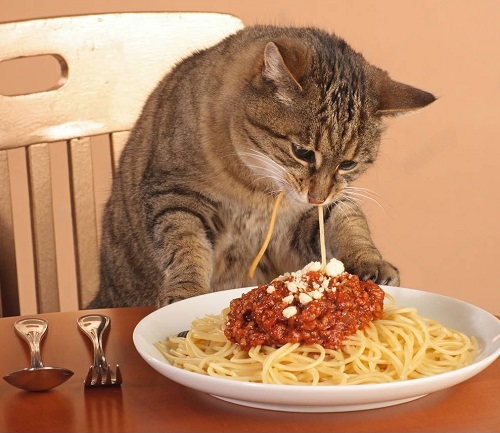
- Ramen is a Japanese dish of wheat noodles in a flavorful broth with various toppings.
- Although non-toxic, cats should not be fed ramen because it’s high in sodium, seasonings, and additives that can be harmful to their health.
- Ramen lacks essential nutrients that kitties need for optimal health.
- Cats can experience gastrointestinal upset, increased thirst, dehydration, lethargy, changes in appetite, abnormal behavior, and allergic reactions if they consume ramen.
- Felines have specific dietary requirements, and their nutritional needs are best met through an appropriate cat food diet and animal-based protein.
- If your cat has consumed ramen, assess the situation, watch for immediate signs of distress, provide fresh water, monitor behavior, and contact a vet for guidance.
Can Cats Eat Alfredo Sauce? Find out here

